WASHINGTON, DC
February 27, 2017
STRANGER: Jim Obergefell
LOCATION: Open City, 2331 Calvert Street NW, Washington, DC
THEME: Breakfast with the lead plaintiff in the landmark U.S. same-sex marriage suit
“Please, call me Jim.”
He’s got one of the most famous surnames in contemporary legal history, but Jim Obergefell prefers chatting on first name terms. That’s how he greeted me for a breakfast interview to discuss his life almost two years after the landmark ruling in Obergefell v. Hodges in which the Supreme Court held that the Constitution guarantees the right of same-sex couples to marry across the United States.
In the time since the June 2015 ruling, Jim’s life has forever changed. Gone is the mild-mannered real estate agent from Ohio who never wanted the limelight. In his place is a new civil rights activist who’s still overwhelmed by the public attention but learning to love his inner extrovert as he travels the country to fight not just for gay rights but for civil rights for all minorities.
Jim’s life is incredibly busy even all these months after the decision. He wrote a book, “Love Wins,” about the high court trial. He’s consulting on a movie of the same book. He’s part of a wine label that sells bottles to raise money for civil rights groups. He’s still being stopped on the street by strangers who just want to shake his hand and share what the case meant for him. And every day he still thinks fondly of his late husband John Arthur, although now with fondness and not sadness. As he described his life nowadays, his eyes enlarged as if to express he was almost overwhelmed by it.
Indeed, the dizzying pace at which he now lives means he hasn’t had much time to adjust to his new home in Washington, DC, or to indulge his hobbies like visiting art museums. So perhaps going by just “Jim” is one way he can cling to some normalcy from his old life.

Given how many strangers he’s interacted with since the court case, Jim said that meeting me for breakfast at the restaurant Open City was no longer a cause for concern. “I have been forced to become comfortable walking into a room and being open and able and willing to have a conversation with someone I’ve never met before,” said Jim. “A few years ago? I would never have done this.”
It’s hard to imagine Jim as an introvert because during our one-and-a-half hours together he spoke at length and thoughtfully about civil rights, yet balanced it with great conversation on a whole host of topics from holiday travel to DC’s restaurant scene. And we had a common connection as we’ve both been interviewed by the Washington Post‘s Mike Rosenwald.
“Mike’s a great guy, he got me dinner and several drinks,” I said.
“He didn’t do that for me!” Jim said in mock outrage and with a hearty laugh.
But most of our talk was about what happens to someone named on a Supreme Court decision long after the ruling comes down — and for Jim his life no longer has a pause button. Jim’s travel planner is packed as he embraces life as an all-issue rights activist — and he plans it all alone, with no secretary. “The biggest accomplishment for me is I’ve yet to get a phone call saying, ‘Jim, where are you? You’re supposed to be in [insert city name], why aren’t you there?’” he said with a chuckle, his natural style to punctuate remarks with a warm smile and good humor.
Among his many projects is consulting on the movie of “Love Wins,” which is expected to focus heavily on the story of Jim and John, and their quest to have Jim listed as the surviving spouse on John’s death certificate. He said it’s a weird feeling to have his life turned into a big screen production. “I just hope they get someone hot to play me,” Jim joked. “I’m excited to experience it.”
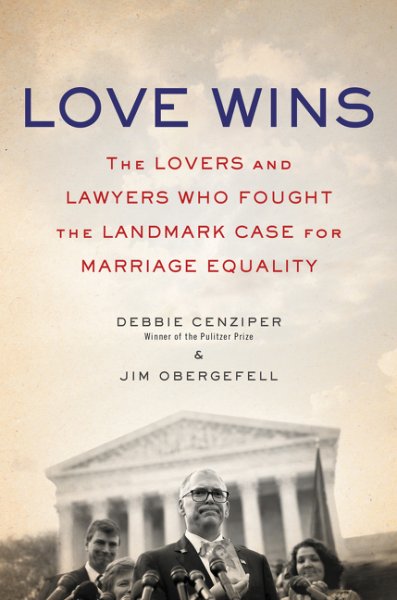
Then there’s Equality Wines, a wine-producing label in California that donates a portion of sales from each bottle to organizations that support equality campaigns. The next wine coming up is called 19th Amendment, after the constitutional amendment that gave women the right to vote.
Jim is also working on civil rights campaigns with groups including the Human Rights Campaign (HRC), the American Civil Liberties Union (ACLU) and Equality Ohio devoted to lesbian, gay, bisexual, trans and queer (LGBTQ) issues. He loves his activism with each group, but is particularly excited about getting more involved with ACLU on the broad spectrum of rights campaigns.
“One is Black Lives Matter, I can’t say that enough,” he said. Jim’s hometown of Sandusky, Ohio, was about 35 percent African American so when he was growing up it wasn’t unusual to him to see people with a different skin color. “That was just normal, they were my friends and you want the same things for your friends as you have for yourself,” he said. Then he moved to Cincinnati, which he said was even more diverse. “So there was never any specific moment where I thought equality was something that was important to me – it was just always part of my life.”
Another issue he’s focusing on is religious discrimination against Muslims, lambasting President Donald Trump’s attempts to ban immigration from several Muslim countries. He faulted Christians who push laws based only on Christian ideals. “You saying your religion deserves special protection, that’s the complete antithesis of religious freedom,” he said.
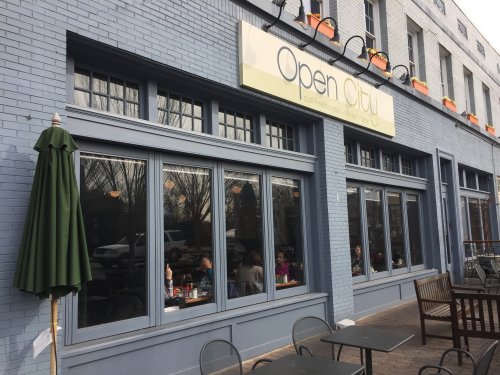
The fights go on. How to deal with refugees. How to push-back against the religious right. “Where do we stop?” he asked. “I feel like so many groups have a target on their backs right now” because of the election of Trump and the Republican control of Congress.
Before Trump’s election, people would ask Jim what they thought of the then-presidential candidate. “I would say I don’t know what he thinks because one day he says this, another he says that. So I never trusted a single thing that came out of his mouth,” Jim said. “But for me the scariest thing is not him, it’s the people he surrounds himself with.”
“I couldn’t care less what Trump says,” Jim added, saying that he expects conservative lawmakers in Congress will propose discriminatory laws that he expects the president to sign.“We know they’re against us. So we’re up for the fight of our lives,” he said.
Among the fights he’s expecting are state-level laws that would actively allow discrimination based on religious grounds, something like a restaurant refusing to serve gay people. And the Republican dominance of state and federal politics has Jim concerned that something broader might be coming, like a constitutional amendment on religious “freedom.”
“They’re drunk on power,” said Jim of the Republicans in the White House and Congress. He told me how he’d recently read an article in Salon that “scares the daylights out of me” because it said the Republicans control a majority of state legislatures and if they can gain more power they’ll be at the threshold they need to shove through constitutional amendments.
So that’s why Jim continues the fight for LGBTQ rights and others.
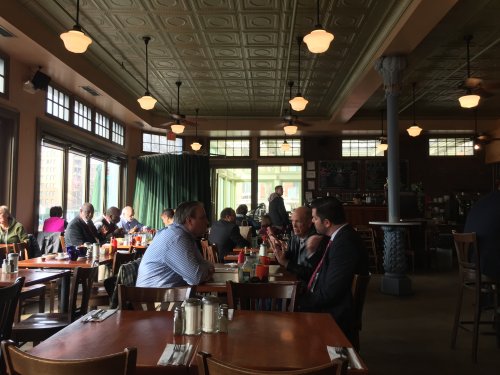
Although he’s now based in DC — home to the headquarters of HRC, ACLU and others — Jim keeps ties to Ohio through his work with the equality group there and regular visits. It’s a way to stay connected to his life there with John in a state that he still loves.
“I’ll always be an LGBTQ activist, but heading up to the presidential election and after, I found my thoughts changing and my image of equality changing,” Jim said. “Yes, I’ll always focus on LGBTQ, but it isn’t just us. It’s every group that is different, every group that feels marginalized and has to fight. So my goal this year is to figure out: What does my activism look like?”
As we placed our orders, Jim said, “I want to broaden my focus, and what I really want to see and my hope is that I can be part of it whatever it looks like, I want organizations to stop fighting each other and work together because we’re all fighting for the same thing.”
Jim gave the example of some animosity toward the HRC in the past couple of years because of some controversial endorsements they’ve given to politicians and other perceived missteps. “It frustrates me at times because no organization is perfect, they do make mistakes, but I think people latch on to that and don’t take the broader view. They need to realize that we’re all still fighting for that ideal of equality and respect, and we should all work together.”
When Jim’s lawyer Al Gerhardstein started the gay marriage case, several national organizations tried to talk him out of it by saying it didn’t fit in with their long-term strategy for winning marriage equality. But Al persisted, and Jim said his lawyer holds no grudge against the groups. “He just said he had clients that were being harmed, and he won them over. People get so tied into their strategy that they lose sight of the fact that we are really all fighting for the same thing,” Jim said.
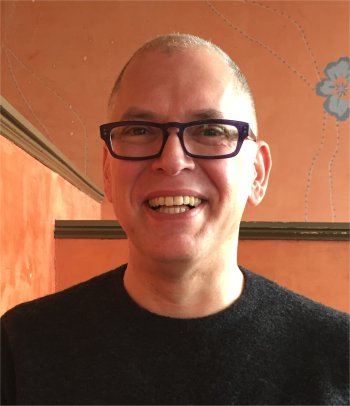
“I’m hoping that the presidential election will help break down some of those barriers, and create more of a ‘we all rise together when we work together’ approach,” he added.
One way that Jim is continuing the LGBTQ activism is fighting against any attempts to pare back gay rights, and to criticize moves like a recent Trump executive order removing a directive for schools to accommodate transgender students’ needs for bathroom facilities. “I feel like our community has a target on our back right now because our successes are so fresh and so recent, the Republicans feel like they can take them back,” Jim said.
Beyond the transgender order the Trump administration has not done much to affect gay rights, but Jim fears it’s only a matter of time. “That order was the opening round.”
He continues the fight for gay rights for everyone, but particularly for his late husband John.
Much has been written about Jim and John’s fight for equality. In a fantastic article, the Post’s Rosenwald chronicled the couple’s legal quest to have Jim listed as the surviving spouse on the death certificate for John, who in 2013 was terminally ill with amyotrophic lateral sclerosis (ALS). At the time their home state of Ohio didn’t allow gay marriage, so they flew to Maryland, which did. They were married by John’s aunt Paulette aboard a plane on the tarmac of Baltimore’s airport, and then flew back to the Buckeye State.
The couple sued for Jim’s right to be listed on the death certificate, and won a federal district court case but lost on appeal. That prompted the Supreme Court case, which consolidated six gay marriage suits and led with Obergefell because it had the lowest case filing number. A clerical fact that meant the ruling — for better or worse — would forever be associated with Jim.
I wondered at what time the reality of the high court case hit him. “So what was your ‘oh shit’ moment — sorry, pardon my swearing, your ‘oh wow’ moment?” I asked.
“You can swear,” he said with a laugh. “I think the big ‘oh shit’ moment was when the 6th Circuit Court of Appeals ruled against us, and realizing at that point I could have said I’m done, I’m tired, I want to go back to my quiet life — but also realizing I couldn’t do that because I still had to keep fighting for John. The ‘oh shit’ moment of filing with the Supreme Court, and the fact they might actually take it, that was when I thought ‘holy hell, this could really happen.”
Jim said the entire experience of being a Supreme Court plaintiff is a daunting one, and that the most emotional moment was on the day of the ruling, June 26, 2015, hearing Justice Anthony Kennedy start to read the majority decision in the 5-4 ruling and realizing it meant they had won. “I finally felt that I actually am an American, and you are treating me as such. For the first time in my life as an out gay man I felt like an equal American,” he said.
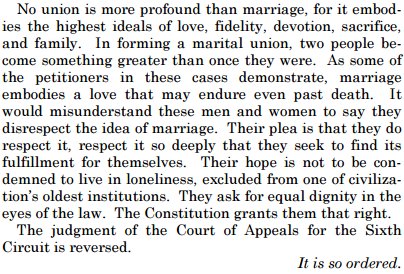
The dissents in the case from the conservative justices “I ignored completely” said Jim with a smile, and he said he’s never met any of the justices. But he’s opposed to Trump’s nomination of Neil Gorsuch to fill the Supreme Court seat left vacant by the death of Justice Antonin Scalia. “I think that he could have nominated someone far worse, but my concern is he’s very pro-corporate, very pro-big businesses and he is not a great gay rights supporter,” Jim said.
Yet even if Gorsuch wins confirmation, Jim is confident that Obergefell is unlikely to be overturned so long as the five justices that made the majority in that case are on the bench.
“And we’re coming up on two years from the decision, that means it’s becoming more and more used as legal precedent in other cases. And the Supreme Court is loathe to take away rights they have granted. So I really do rely on that. I’m not an attorney, and if these smart attorneys tell me not to be as worried as I am, then I listen to them,” Jim said.
With almost two years of a victory lap behind him, I wondered if Jim had any regrets — such as being shoved into the limelight, or maybe if he got any harassment.
“Not a one, no regrets,” he said. “From the moment we filed the case through to the decision and a little bit after, I got hundreds, thousands of cards and letters in support, people stopping me in the street to share their stories and thank me. And in that same time I got just two pieces of mail that were less than supportive, just some bible verses,” he said.
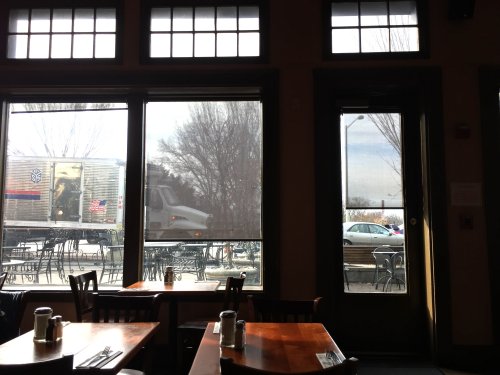
When Jim and John filed the case, some people asked whether Jim should be spending so much time away from his dying partner by focusing on the case. But Jim says the couple spoke about this very issue. And they made it work. Although Jim was in court for some hearings, a lot of the time he was with his partner so he doesn’t feel it affected their happy marriage in any way.
He shared this and other thoughts in “Love Wins,” and says he still gets letters praising the book and telling stories about how people have been reading it on public transport and bursting into tears. The book is co-authored with Debbie Cenziper, who interviewed Jim about his life and about his time with John, using much of that material for the book. He described is as a cathartic process that helped with healing from John’s death. “I cried a lot but I also laughed a lot,” Jim said. “Debbie was so good at pulling out memories I didn’t realize I still had. It was very painful at moments, but it was a really good process for me and the response has been, and still is, fantastic.”
About two years ago, a gay man whose father had died from ALS and shared his story with Jim, and they began corresponding. Eventually they met for dinner, which was an unusual thing for Jim — then still more introverted — to do. But the conversation about life, love, and more “was a turning point for me mentally and emotionally,” he said. And that helped him become more extroverted, and better at talking with strangers, including getting breakfast with one. “Going out for breakfast with somebody I’ve never met? That’s par for the course for me now,” he said.
The outfall from the Supreme Court case also helped Jim evolve to a place where he finally felt comfortable to leave Cincinnati where he’d lived for so many years with John.
But before we could return to discussing his new life in DC, our meals arrived.
“That’s a lot of carbs!” said Jim with a grin as he saw my breakfast.
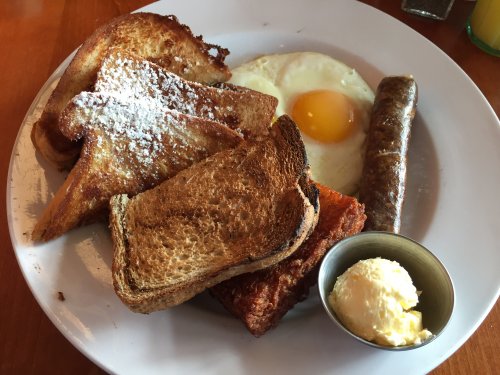
Indeed it was. I had the Open City Royale with two eggs sunny side up, chicken sausage, hash browns, pancakes, french toast and rye bread. It’s hard to get excited about such simple breakfast food, but top marks to the chef for cooking all of the components well. But it was definitely way too heavy on the carbohydrates, and I ended up leaving most of the bread and pancakes.
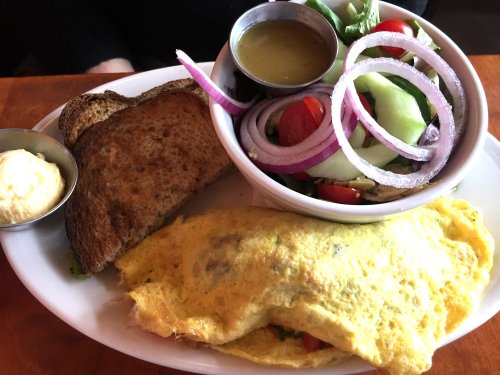
Jim went for a healthier option of a vegetable omelet filled with mushrooms, broccoli, tomato and Boursin cheese, served with a small salad and some rye bread. He seemed to enjoy his food, and we chatted briefly about Jim’s experiences with dining in the District. Our breakfast marked the first time Jim had tried Open City, which is a welcoming diner with brightly colored walls and large windows letting in plenty of natural night in the morning.
I was happy to help Jim tick at least one restaurant off the to-do list said that he’s still learning about the city’s burgeoning restaurant scene as he only moved here recently.
About one year ago, he started to rent an apartment in DC as a base for his activist work, but still considered Cincinnati his home. But a combination of factors persuaded him to make the permanent shift to the nation’s capital: Traveling more because of the aftermath of the case, realizing DC is home to many of the activist groups he wanted to help, and realizing that after 32 years in Cincinnati — many of them spent with John — perhaps it was time for a new chapter.
“Two years ago a friend asked me if I’d ever leave Cincinnati and I said no, but then I started to let myself think about it honestly and I realized for the first time I was open to leaving,” Jim said. “Once that idea took root, I couldn’t shake it. I felt I needed to take a risk and do this.”
He also noted that his personality was starting to change from what it had been in Ohio, where John was the incredibly social, funny one and Jim was the quieter one who wasn’t as good as connecting with a room full of strangers. “In some ways, I feel like I’ve reconnected a bit with how I was before I let John take the reins. But I’ve also been forced to become comfortable and able and willing to have a conversation with someone I’ve never met before,” he said.
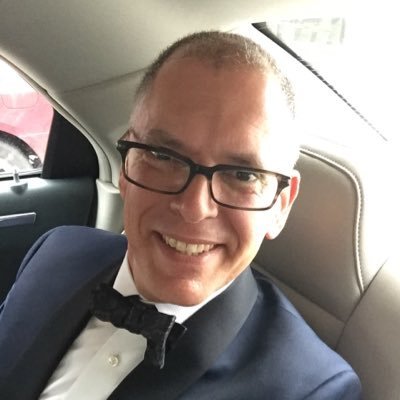
Jim wants to explore all that DC has to offer, and says that art museums are his “therapy,” but that he has such little free time he usually just spends his quiet hours in the city with friends.
And he’s even toyed with the idea of dating but very tentatively. He’s not a fan of the swipe left or swipe right dating apps like Tinder where if you don’t match physically you’re don’t even get a chance. He experimented with an OKCupid profile, but struggled as people recognized him and as a public person he thought it wasn’t the best idea. “I’m not built for online dating,” he said with a shrug and a laugh, saying he much prefers meeting people in person.
But he still and forever will miss John, and his obvious love for his late husband helps explain why Jim’s in no rush to rejoin the dating world. “The most ridiculous things will make me think of him, and I think about him constantly,” he said. “I miss him, but there’s not the level of sadness that there was before. I’ve healed fairly well. Instead, it’s more a sense of gratitude and feeling fortunate that I had him in my life. So when I think of John, it isn’t a downer.”
After finishing our food, Jim told me that one impact of the Obergefell ruling was to create “a sense of family” among the plaintiffs and their lawyers. They’ll keep in touch on and off, and catch up at various speaking engagements, book signings, and other events.
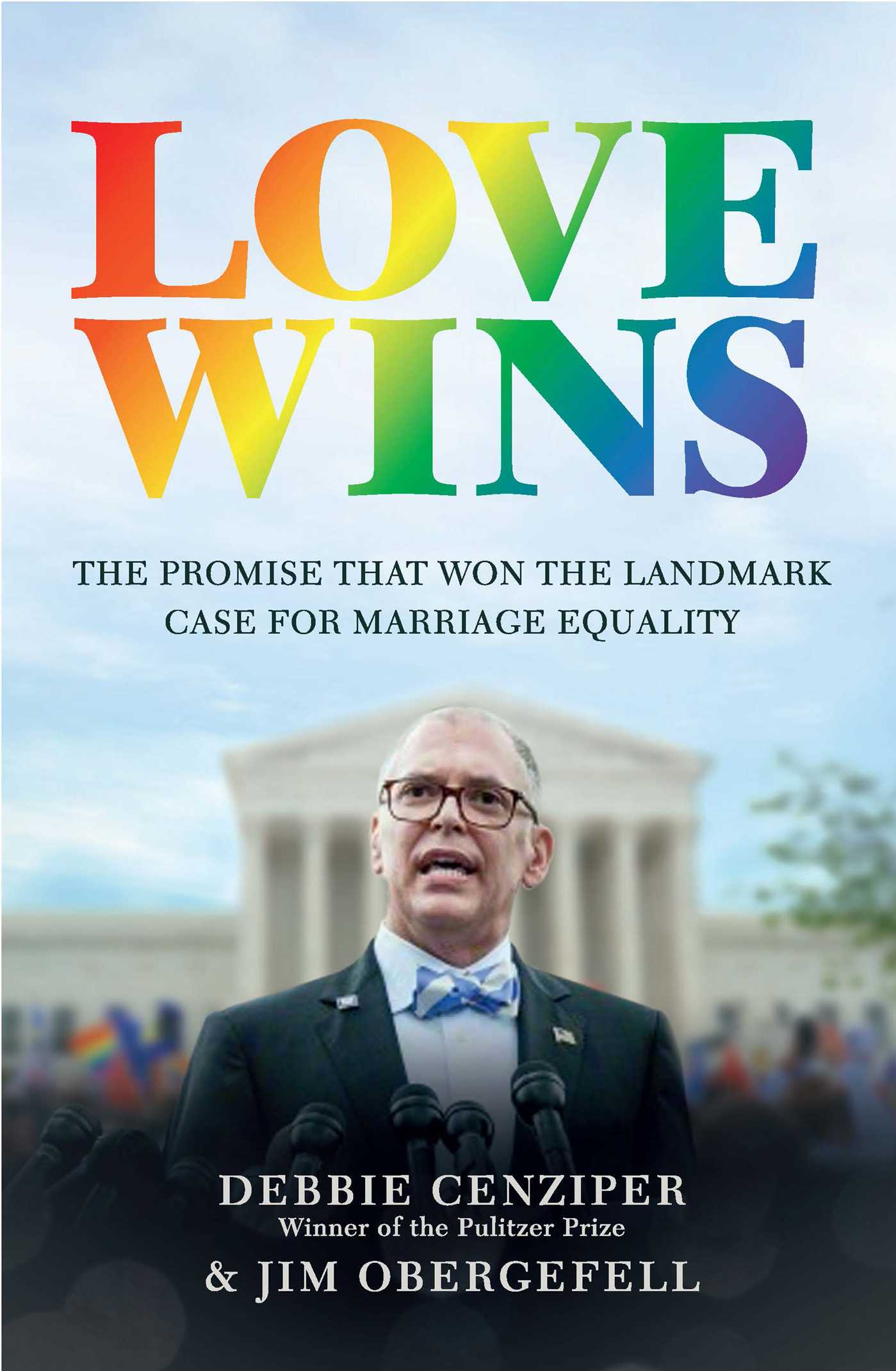
Jim’s own touring for “Love Wins” took him to Australia, which is still debating marriage equality. He was invited there to speak on the issue and told the audience that the way to pitch the fight is to tell the personal stories of those affected by legal prohibitions on same-sex marriage. “That helps people understand it’s not some arcane legal argument, but it affects real people.”
He also visited Ireland to receive the Praeses Elit award from the Synge Theatre Trinity College Law Society, and said he was pleasantly surprised that the heavily Catholic country had enacted marriage equality. “If you could have picked one of the countries that I thought would have been one of the last to do this, it would have been Ireland,” he said.
Those global travels his piqued Jim’s interest in getting more involved in LGBTQ and other human rights issues internationally. But for now, he’s got more than enough to work with as he ramps up his activism on his quest to fight for equality for disadvantaged minorities.
As we got ready to leave and go our separate ways, I told Jim that it might be a no-brainer, broad question, but I wanted to know why equality is important to him. He pondered for a long time. He talked again about how equal rights has always been a part of his life, from his childhood in Sandusky to his present-day activism. And then he smiled as he hit on a response.
“I don’t know how to answer that other than to say, ‘Why shouldn’t it be?’”
ybvn1p
aqwl8c